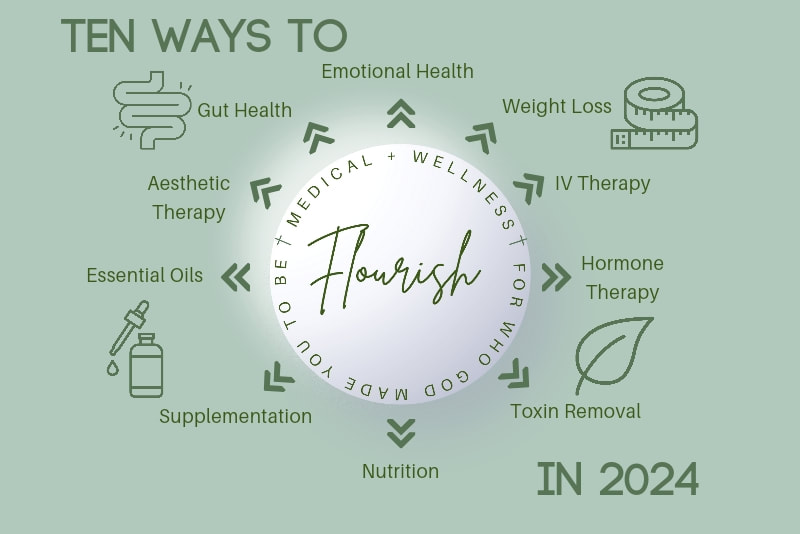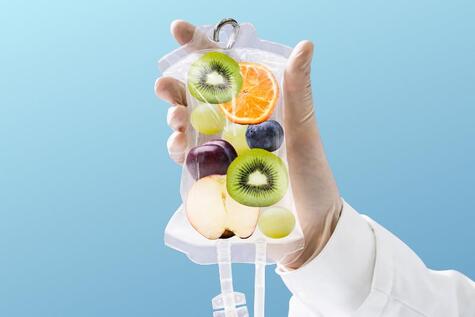And let's not forget about vitamin D, often called the "sunshine vitamin." Many of us don't get enough sun exposure, especially during the winter months or if we live in areas with limited sunlight. This can lead to a deficiency in vitamin D, which is crucial for bone health, immune function, and mood regulation. That is “why” you need to pay attention to the nutritional gaps in your food consumption, but let’s look at “what” you can do about it and “how” you can become healthier. Functional Medicine takes a holistic approach to health, focusing on finding the root causes of health issues rather than just treating symptoms. This approach considers factors like genetics, environment, and lifestyle, which can all impact our nutrient levels. How to increase your intake of vitamin B12, iron, and vitamin D // Add the following foods to your diet:
So, this National Nutrition Month, consider incorporating Functional Medicine and a balanced diet rich in whole foods into your health routine. At Flourish we use advanced testing to assess your nutrient status and offer recommendations to optimize your health through targeted supplementation. Professional grade supplements are available at the clinic, or you may order them from our online store.
In the midst of our bustling lives and convenience-oriented diets, it's crucial to shed light on the importance of heart health. February is Heart Health Awareness Month, a timely opportunity to explore comprehensive strategies, including functional medicine, for cardiovascular well-being. It's essential not only to focus on managing cholesterol but also to examine the potential negative impacts of relying solely on medication. Flourish's Approach to Addressing High Cholesterol:
Approaching heart health with lowering cholesterol as the goal, here are some considerations and healthy tips.Understanding Functional Medicine:Functional medicine, a holistic approach, seeks to address the root causes of health issues rather than merely treating symptoms. In the context of heart health, functional medicine takes into account various factors such as genetics, lifestyle, nutrition, and environmental influences to create a personalized plan for prevention and treatment. Tips for Lowering Cholesterol:
Nutrition Tips for Heart Health:
Considering Medication's Negative Impact: While medications can play a role in managing cholesterol, it's essential to acknowledge potential downsides. Medications may carry side effects, ranging from muscle pain to liver issues. Furthermore, relying solely on medication may lead to a false sense of security, potentially neglecting lifestyle changes that are crucial for long-term heart health.
At Flourish Medical + Wellness, we want you to thrive. That’s why we commemorate Heart Health Awareness Month and invite you to commit to prioritizing cardiovascular well-being. Functional Medicine, combined with lifestyle changes and nutritional adjustments, provides a holistic approach to heart health. Additionally, considering the potential negative impacts of relying solely on medication encourages a more balanced approach. By making informed choices, we can work towards reducing the risk of heart disease and fostering a healthier, happier life. Remember, your heart deserves comprehensive care, so take steps today and flourish tomorrow. Contact us to discuss your health concerns. At Flourish Medical + Wellness, we're all about making sure your body works at its best. We’re very aware of the research compiled over hundreds of years on how to keep people healthy and thriving. And we aren't fond of just extending life by taking meds every day to cover up symptoms. Our approach to medicine is all about helping you live long and stay healthy, as God intended. Here are ten ways to flourish as we partner with you in your wellness. #1 Weight LossAt FMW we believe that an effective weight loss program needs to be tailored to each individual’s lifestyle, health, age, and hormone levels. Therefore, we offer a variety of weight loss options in order to provide optimal results for each individual patient. With the goal of sustainable weight loss, the best approach is with a balanced and individualized strategy that considers factors like nutrition, exercise, mental well-being, and long-term habits. Restoring optimal hormone levels, testosterone, estradiol, and thyroid, is an integral part of a successful weight loss plan. This makes weight loss more attainable as well as sustainable! Learn more about FMW weight loss testing and treatments>> #2 IV TherapyIntravenous (IV) nutrient therapy is a treatment which includes ingredients like essential vitamins, minerals, and amino acids proven over decades to play a significant role in our health and wellness. IV nutrient therapy is a safe, effective, and restorative therapy used to aid in treating several medical conditions and to boost your immune system. Our IV therapy is customized to meet each individual’s nutritional needs and is administered directly into the veins which provides significantly more benefit than oral and traditional supplements and medications. Check out the benefits and our nutrient menu>> #3 Hormone TherapyHormone imbalance happens to both men and women and can have a significant impact on overall health and wellness. Hormones are one of the most important regulatory systems in the body. They function as messengers, interacting with specific target cells and organs to stimulate them into action. Hormone replacement therapy offers relief from many of the uncomfortable symptoms caused by a hormone imbalance. It can change your life! Read our patient’s stories>> Understand your options and learn more in the video from Jackie Tewes>> #4 Toxin RemovalGod designed our bodies to be able to detoxify and heal in most circumstances, however, with continuous toxin exposure and a lack of nutrient dense foods to nourish our bodies and support healing, those natural detoxification pathways can become blocked or stagnant. When this occurs, toxins build up inside the body and can cause diffuse inflammation, leading to disease processes. At Flourish, we offer thorough toxin testing and detoxification options. Discover the symptoms of toxin overload>> #5 NutritionWe have all heard (and likely tried) dozens of diets to help us achieve our weight goals. Nutrition means so many different things to each of us. The focus that we offer is to rely on natural, healthy foods that nourish our bodies in order to help us function optimally. Small, sustainable changes are the focus as they are often longer lasting solutions and easier to implement. That’s why we offer a handy (free) Food Swap Guide to make healthy grocery shopping a little easier. At Flourish, we also partner with you through holistic Functional Medicine methods. Perhaps intermittent fasting is an approach you’ve been wanting to investigate. We’ve got a great resource for you. #6 SupplementationOur best resource for nutrition should be food but there are many situations where we need to look at supplementation to enhance the amount of vitamins and minerals our bodies are receiving. Most American diets are full of refined carbohydrates and sugars and are insufficient in essential vitamins and antioxidants. This can leave you deficient in many key nutrients that are needed to prevent chronic disease, and to run all body systems effectively. A balanced diet provides a source of vitamins and minerals, but taking dietary supplements with your healthy diet is beneficial in ensuring your body has enough of the nutrients it needs each day. Our (free) Holistic Home Remedies booklet is a great place to start! And our supplement recommendations are available for you to purchase online or at our clinic. #7 Essential OilsEssential oils are concentrated extracts derived from various plants and have been used for centuries for their potential health and wellness benefits. While individual experiences can vary, here are some commonly reported benefits of essential oils: aromatherapy, stress and anxiety reduction, improved sleep, pain relief, immune system support, headache relief, skin care, natural air freshener, home cleansers, mood enhancement, and repelling insects. With so many benefits and essential oils to choose from, it’s a great way to flourish! You can learn more and order from our own doTERRA essential oil shop>> #8 Aesthetic TherapyAt Flourish, our definition of wellness encompasses all aspects of whole-person care, including physical, mental, and emotional wellness. Appearance can have a profound impact on wellness and how we interact with those around us. That is why we offer aesthetic treatments and have chosen to use the safest FDA-approved products to keep you feeling and looking your best. Botox® Cosmetic is the first FDA-approved treatment to improve frown lines, crow’s feet, and forehead lines in adults. The best results come from a well-trained medical provider who understands facial anatomy and musculature and customizes treatment to each individual patient. That's one of the reasons to schedule your Botox® Cosmetic treatments with us. Learn more>> #9 Gut HealthIn recent years, there has been a growing interest in the relationship between gut health and overall well-being. We now understand that the gut plays a central role in our health, impacting everything from digestion to the immune system and even mental health. One approach that's gaining traction in the pursuit of optimal gut health is functional medicine. At FMW we also know the increasing exposure to toxins in our environment can worsen symptoms. That is why we offer a parasite protocol. Parasites weaken the body’s natural defense mechanisms which allows for easier invasion by parasites. They may be the underlying trigger for a variety of chronic health conditions, like autoimmune diseases and irritable bowel syndrome. We offer testing and treatment! Learn more about parasite protocol>> #10 Emotional HealthTo flourish, we must place a priority on our emotional wellness. Our medical practice seeks to bring wholeness through physical, emotional, and spiritual healing. That’s why we offer more in-depth testing. If you have been struggling with physical, mental, or emotional symptoms that have no known or identifiable cause, a trapped emotion may be the cause. Working with the Governing Meridian energy pathway and applied kinesiology, these trapped emotions can be identified and removed, leading to healing and improvement or resolution of the associated symptoms. Learn more>>
We’ve shared a few of the ways you can flourish in 2024! Hopefully, you’ve discovered what makes us different from other medical clinics. Our personal approach to YOUR individual needs is the focus. And the treatments and plans we suggest for you aren't determined by insurance companies. Instead, we give you the care that fits you like a glove. We look at your symptoms, offer appropriate testing, complete a comprehensive assessment to determine your care plan. It's all about personalized care here at Flourish Medical + Wellness. Learn more about our Team and call us to schedule your first visit!
The Basics of IV Nutrition TherapyIV nutrition therapy involves the administration of a customized blend of vitamins, minerals, amino acids, and other nutrients directly into the bloodstream. By bypassing the digestive system, this method ensures quick and efficient absorption, allowing the body to receive a higher concentration of nutrients than would be possible through oral supplements alone. Now, let's delve into some of the remarkable benefits of IV nutrition therapy: 1) Rapid Nutrient AbsorptionOne of the standout advantages of IV nutrition therapy is the speed at which nutrients are absorbed by the body. Unlike oral supplements, which must first pass through the digestive system, IV infusion delivers nutrients directly into the bloodstream. This rapid absorption can be particularly beneficial for individuals with digestive issues or those who struggle to absorb nutrients effectively through the digestive tract. 2) Increased Energy LevelsAre you feeling fatigued and sluggish despite a seemingly healthy lifestyle? IV nutrition therapy might be the boost you need. The infusion of essential nutrients can enhance energy levels, helping you feel more revitalized and ready to tackle the demands of daily life. It's a popular choice for those facing chronic fatigue or recovering from illness. 3) Immune System SupportThe immune system is our body's first line of defense against illness and infection. IV nutrition therapy can provide a powerful immune system boost by delivering high doses of vitamin C and other immune-supporting nutrients directly to the bloodstream. This proactive approach to immune health is especially attractive during cold and flu seasons or when facing increased stress. 4) Hydration and DetoxificationIV nutrition therapy often includes a hydration component, making it an effective way to address dehydration. Additionally, some formulations include nutrients that support the body's natural detoxification processes, helping to flush out toxins and promote overall wellness. 5) Enhanced Athletic Performance and RecoveryAthletes, fitness enthusiasts, and weekend warriors alike are turning to IV nutrition therapy to optimize their performance and recovery. The infusion of amino acids, vitamins, and minerals can aid in muscle repair, reduce inflammation, and speed up recovery after intense physical activity. 6) Stress Reduction and Mental ClarityThe demands of modern life can take a toll on mental well-being. IV nutrition therapy can help alleviate stress and promote mental clarity by supplying the brain with essential nutrients. This can be particularly beneficial for those experiencing high levels of stress or individuals seeking cognitive enhancement. In the quest for optimal health and well-being, IV nutrition therapy emerges as a promising ally. By providing a direct and efficient pathway for nutrient delivery, this innovative approach offers a range of benefits, from increased energy levels and immune system support to enhanced athletic performance and mental clarity. At Flourish, we offer a variety of IV Therapy blends and invite you check out our menu and learn more about what we offer. So, why not consider nourishing your body from within and unlocking the potential of IV nutrition therapy? Your health and vitality may thank you for it!
How do we combat childhood obesity? National Childhood Obesity Awareness Month provides an opportunity for us to collectively address this issue.
The growing concern is that childhood obesity is no longer an isolated issue; it’s a full-fledged public health crisis. According to the Centers for Disease Control and Prevention (CDC), childhood obesity affects about 1 in 5 children and adolescents in the United States. The implications of this statistic are far more profound than mere numbers – it’s about the children who grapple with health complications, social stigma, and diminished quality of life. National Childhood Obesity Awareness Month serves as a wake-up call, urging us to recognize the urgency of addressing childhood obesity in America. By understanding the contributing factors and taking proactive steps to promote healthier lifestyles, we can pave the way for a brighter, healthier future for the younger generation. This month is not just about awareness; it’s a reminder for each family to access lifestyle and food choices. Let’s each make a commitment to foster an environment where children can grow up healthy and flourish.
Muscle TestMuscle Testing, also known as Applied Kinesiology (AK) or Nutrition Response Testing (NRT) is done through testing the response of the body’s nervous system. NRT analyzes the flow of energy at different areas of the body to help us better understand how every organ is functioning as it relates to the state of health of an individual. With NRT/AK the practitioner gently contacts different areas of the body with his/her hand. With the other hand, the practitioner will test the strength of the muscle of the patient’s arm. If the area/organ being tested is under stress, the nervous system responds by reducing energy to the arm muscle and the arm weakens. The weakening of the arm muscle signifies underlying stress or dysfunction. How can this possibly work? Consider what happens in the body with hypothermia. The extremities have the most damage because the body pulls all its energy to the core to protect the life-sustaining organs. The same concept applies when we make contact with a stressed organ/area, the body pulls energy to the organ being tested and the patient’s arm will weaken. Organic Acid TestAre you experiencing…
The Vibrant Organic Acids panel uses the most advanced mass spectrometry technology to assess 75 metabolic markers in urine. It includes 11 subpanels and provides accurate evaluation of intestinal microbial overgrowth, detoxification, mitochondrial markers, neurotransmitter metabolism, glutathione status, fatty acid metabolism, and inborn errors of metabolism. (We’ll share an explanation of each during your test results visit.) Environmental Toxin TestAn additional method of understanding the state of your physical health is with urine toxin testing by Vibrant Wellness. This urine test provides an in-depth look at the toxic burden on your body. This test detects:
At Flourish, we support you on your wellness journey by offering a holistic approach to health and healing. We address physical, emotional, and spiritual wellness as we know all are important to your ability to flourish. Call us to discuss our expanded testing options and to schedule a consultation.
Testosterone is a very important hormone for both men and women. Levels begin to decrease in women 10 to 20 years prior to menopause. In men, levels drop each year beginning in the 20’s - 30’s. There are significant consequences with regard to aging because of declining testosterone levels. There are testosterone receptors in most cell types in the body, making it a vital hormone for maintaining youthfulness and vitality. Our goal is to optimize your levels of testosterone, not just replace some of what is lost. In men, we achieve levels betweens 1000 and 1200, which is the upper quartile (25%-ile) of the normal range. Most men in their thirties and above are in the 200 to 500 range. A normal range for women is not well established. After treating over a million women in this country, researchers at BioTe have found that women feel the best, with the least side effects, at levels from 150 to 250 or higher. This can vary as every person is unique and special. Blood levels will be checked 2-5 weeks after pellet placement to ensure that the optimal range is achieved. If levels are below optimal, we will provide a ‘boost’ with your office visit follow up at no extra charge. In addition, testosterone prevents and treats osteoporosis, protects the heart, lowers blood sugar, and decreases the risk of Alzheimer's Disease and breast cancers. Learn more about the Bioidential Hormone Replacement Treatments we offer at Flourish. Contact us to make a consultation.
Early Detection and Screening GuidelinesThe current methods of early detection and breast cancer screening are flawed. Some detection methods are not effective and cause unnecessary fear and stress. And although there are risks with obtaining mammograms at a young age, for young women, early detection is needed. We are seeing cancer rates rise in younger age groups. While 3D offers a clearer picture, is more accurate, and the new standard for screening – the cost is not always covered by medical insurance plans and the levels of radiation are much higher. The 2D traditional method is known for high rates of false positives and false negatives. It also causes radiation exposure, thus, making it ineffective screening method. Another option is thermography. This method uses an infrared camera to detect heat and blood flow. Thermography is free from health risks, is best for dense breast tissue cancer detection, and for those under 50 years of age. The cost for the screening is around $150-200 dollars. Unfortunately, it can take years for screening recommendations to change. We are seeing a rise in breast cancer rates in young women, but screening recommendations are not reflecting that. Breast self-exams and thermography may be the best options. A helpful resource can be found on the Centers for Disease Control and Prevention website. Breast Cancer Screening Guidelines>> Risk Factors You Cannot Control
8 Risk Factors You Can Control
Prevention Steps
There is not a perfect way to detect breast cancer early without increasing risk; that’s why prevention is so important. We suggest regular exercise, eating organic foods, avoid and reduce toxins, conduct self-exams, and know your body. Listen to your intuition, and if you think something is wrong – visit your doctor.” – Jackie Tewes At Flourish Medical + Wellness, we emphasize the importance of optimizing God’s design of the human body to provide natural healing and protection. Our individualized medical care will allow you to strengthen your body and enable it to function exactly how it was made to. We strive toward wholeness: being well in mind, body, and spirit. Contact us with your health concerns and schedule and appointment.
Young ChildrenIndependent and active! Young children get into everything their curious hands can reach. Home safety is as important as hygiene. Check your home for hazards like stairs, water zones like pet bowls, and small toy choking risks. Let's listen to the advice of medical and dental professionals for preventative measures and childhood wellness recommendations. Steps like brushing their teeth, not overusing humidifiers, frequent hand-washing, and covering coughs are daily essentials in the well-being of your young child. TeenagersEssentials for the healthy teenager include eating right, staying active, and getting enough sleep. Easier to say than to do.... or enforce. But planning ahead and being consistent might guide your teen toward making healthy choices naturally. Offering healthy food options at home, taking family hikes, spending time unplugged in nature, and enjoying family meals together will help to create a lifestyle of wellness. Mental and emotional health play an important role in the aging process for tweens and teens. Keeping their emotional needs on your radar and being aware of drastic changes in mood is essential. Reach out to a medical professional as a resource. Supporting and encouraging your teen to become involved in sports and physical activity and visiting your dentist and doctor regularly are two great steps toward healthy aging, too. 20-SomethingsOh so wise and yet, so young - twenty-year olds feel free and youthful. But, now is the ideal time to adopt good habits that will lead to healthy aging. Establish healthy sleep habits now for physical and mental well-being. Learn to cook healthy meals at home, maintain an active lifestyle, and protect your skin with SPF every day! These habits are a great way to set the wellness course. In your twenties, you should get a physical exam every year and make your health a priority. Knowing your limitations on social activities and reducing stressful situations are needed for all age groups, but at 20-something your energy seems boundless, so you may need a reminder to practice moderation. Mid 30s-40sYour mid-thirties can be a milestone for many reasons. You might be enjoying career advancement and a larger social circle. Perhaps you've established an active lifestyle and are making better eating choices. While these things are essential for healthy living, your body is going to age at a different rate and make some major shifts in the coming years. Awareness and strategy will help you stay the course. Your diet should include more high-fiber foods as they will give you fewer years of biologic aging. And bone density is formed in our younger years, so by age 30 new bone formation is completed. We recommend annual wellness visits and labs to check your vitamin D level. Vitamin D turns into calcium in the body. The exercise routine you currently enjoy may need to change. Muscle mass decreases 3-8% per decade after age 30, so you should be adding strength training to your routine three times per week to boost your metabolism, burn fat, and remain lean. Male and female hormonal changes can begin as early as age 25, but now is when you need to pay extra attention. Many symptoms and discomforts could be a sign of increased risk for disease. Schedule a consultation with us and learn more about recommended hormone treatments and live the healthy full life God intended for you. 50+Degenerative conditions can start earlier in life, but typically 50 is the age when we see and feel dramatic changes in our body. It serves as a reminder of the importance of wellness exams for early detection and symptom diagnosis; and reinforces the value of maintaining an active lifestyle. This generation (Baby Boomers) has more 55+ active living communities available to them than any elderly generation in the past. Great resources are available to them, and the options are vast. We invite you to learn more about osteoporosis and its effects on aging. Two Important Factors on Aging(1) Prevention There is a reason why many health and medical insurance plans include free annual screenings and wellness exams. It's because they work. Early detection and diagnosis significantly improves your health and quality of life. (2) Toxin Exposure At any age, we should be concerned about our exposure to toxins. We share some frightening insights in this blog post. You may want to review it! We list specific information on the environment we are exposed to. Did you know toxins are fat soluble? It means they are stored in our fat and can remain in our bodies for years, or even decades. This causes changes in our bodies and greatly affects our aging process. Our body cannot keep up the fight without our help. Therefore, we need to avoid new exposure and actively work to remove the old toxins. Not Just Great Advice: These 10 Tips wil help maintain a healthy lifestyle, but they focus on the "staying" healthy concept. We want ot help you "start" a healthy lifestyle. The post is very inspiring and nicely outlines each area of our life as a specific focus. Actively making healthy choices in the exercise, diet, social, and mental areas of our life will support wellness. At Flourish, we'd add a spiritual focus to bring wellness into the fullness of life as God intends it: wholeness. Learn more about our team approach to your health and wholeness. And contact us with questions today.
Food Contamination
Water Pollution
Air Pollution
It helps to understand that toxins are fat soluble, meaning they are stored in our fat. This allows them to remain in our bodies for many years or decades. So, with continued daily exposure to even small amounts, the total amount of toxins in our bodies gradually increases. Toxins are also stored in the fatty tissues of animals and therefore are in the animal products we consume. Now, let's uncover the long-term effects of chemical exposure. PCBs (Polychlorinated Biphenyls)
Dioxins
DDT (Dichloro Diphenyl Trichloroethane)
Phthalates (Group of synthetic chemicals)
If we consider our exposure to heavy metals, we can see the effects on the enzymes that are crucial to produce our mitochondria. Mitochondria is an organelle found in large numbers in most cells, in which the biochemical processes of respiration and energy production occur. Our body's energy is particularly sensitive to the effects of heavy metals. And finally, we'll explore the sources and results of exposure to heavy metal toxins. Heavy Metals: Lead
Arsenic
Mercury
We paint a dark picture, but now that you are aware of the sources of toxicity, here are steps you can take to lessen your exposure. What You Can Do
If you are experiencing symptoms of inflammation or would like to know more about your personal exposure to toxins, call us to schedule a total toxin test to check for levels of toxin poisoning. We'll give you the resources and care you need. Source: Hypothyroidism Type 2, Dr. Mark Starr
|
Blog Categories
All
|
|
Flourish Medical + Wellness (FMW)
14070 Commerce Ave NE, Suite 300 Prior Lake, MN 55372 Phone: 952-208-7029 // Fax: 952-214-0866 Clinic Hours Monday through Thursday 8:30 - 3:30 "May you be blessed by the Lord who made heaven and earth." Psalms 115:15
|
|
©2021-2024 Flourish Medical + Wellness
|










